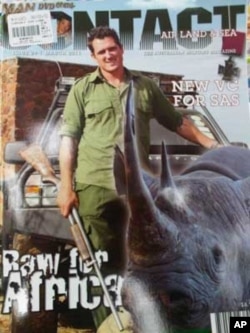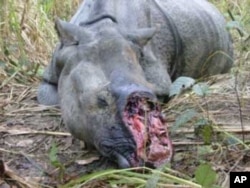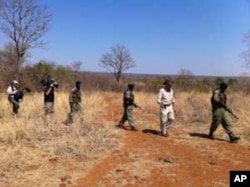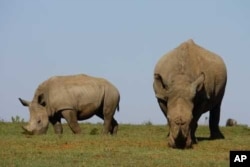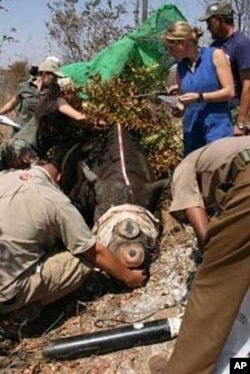Two years ago, after surviving 12 tours of duty in Iraq, former Australian Special Forces soldier Damien Mander was searching for a fresh challenge.
He found it in an unlikely place.
“A week before I arrived in Zimbabwe, I couldn’t have shown you where it was on a map. My visit to the country was just part of an adventure, really. Sitting in Melbourne after Iraq, I had an idea to visit Africa, as I’d never been there before,” Mander explained.
While traveling through Zimbabwe, though, he witnessed something that he said “flipped a switch” in his mind.
“We saw an elephant that had been poached in a national park and for me that was the catalyst,” said the tall, burly man, whose work in Iraq for an elite military squad included the protection of politicians, foreign diplomats and other VIPs.
Mander had come to Africa to escape the death and destruction he’d seen in the Middle East. Instead, he found himself staring at more horror – in the form of the bloodied, rotting carcass of an elephant, riddled with bullets and its tusks hacked off.
He told VOA, “I know what it feels like to be hunted by humans and so I’m able to sympathize with animals that are hunted by poachers.”
A white guy in the African bush…
Mander began gathering information about the poaching scourge that’s swept southern Africa in recent years. The ex-soldier heard that sophisticated international criminal networks are targeting rhinos, in particular, for their horns. The slaughter is driven by a scientifically disproven belief in some parts of Asia that ground rhino horn cures cancer. Rhino horn now costs about $57,000 a kilogram on the black market, according to the International Rhino Foundation.
The enemies of wildlife in southern Africa are no less ruthless than the guerilla insurgents he faced in Iraq, said Mander. The poachers are using military equipment, such as night vision goggles, assault rifles and helicopters, to target rhinos more efficiently in their efforts to claim massive profits. They either shoot the rhinos dead or dart them with high doses of veterinary drugs before hacking their horns off and leaving them to bleed to death.
In the past few years, poachers have butchered more than 1,300 of the rare creatures in southern Africa. Most of them were killed in South Africa and Zimbabwe.
During his tour of the region, Mander became increasingly convinced that his specialized military skills could contribute significantly to efforts to prevent poaching.
“One of the things I noticed the most when traveling through Africa…is that rangers just are not trained to do their jobs properly,” he said. “And these guys are going out and putting their lives on the line every day, and they deserve to have the training that’s going to give them their best chance of survival and their best chance of achieving in their job.”
Mander offered to provide this training, free of charge, to wildlife rangers throughout southern Africa. “I knocked on doors in South Africa, Namibia, Botswana and Zambia, but I couldn’t get a start with an anti-poaching unit,” he said.
Mander now acknowledges that the suspicion with which he was treated by regional wildlife authorities in 2010 was “justifiable.” He said, “I mean, you’ve got some guy from Australia coming and knocking on doors in Africa and saying, ‘I want to help you with your problems’ – a white guy with a Special Forces background trying to run around the bush in Africa.”
Baghdad tactics applied to Africa
But Mander refused to give up … his desire to help to save Africa’s rhinos. Because no game reserve would take a chance on allowing a person with no previous experience in the wildlife industry to train their staff, he made what he now calls a “crazy but correct” decision. He sold his assets in Australia and used all the money he’d earned in Iraq to fund the establishment of his own ranger training center. After talks with Zimbabwean authorities, he based it at Victoria Falls and named it the International Anti-Poaching Foundation.
Some of the wildlife parks that initially didn’t trust the Iraq War veteran now send their rangers to him to be trained to use military tactics against the poachers.
Mander explained, “We haven’t got the funding to purchase helicopters and other aircraft that would enable us to meet the (poaching) threat head on in terms of force, so we have to rely on the way we prepare ourselves for this fight. It comes down to skills and training to enable us to stop the poachers.”
In Iraq, he was also project manager for the Iraq Special Police Training Academy in northern Baghdad, where he helped train hundreds of paramilitary police officers.
“Baghdad is very different to the bush of Africa but many of the principles of security and policing that we applied there can be applied against poachers in Africa,” said the former Special Forces operative.
Mander said the instruction he gives to wildlife rangers is diverse. “It’s everything from search and arrest, to patrolling techniques, to survival in the bush, to navigation and radio use.”
Uniquely, his foundation provides the training free of charge. The organization is funded entirely by donations.
Navy Seals
Mander trains rangers using methods similar to those used by the United States Special Forces, including elite military squads such as the Navy Seals.
“If we’re to save the rhino, we really have no choice other than to employ these kinds of tactics against the poachers,” he said. “Rangers can no longer function like a bunch of boy scouts in the bush. We’re no longer dealing with amateurs here; we’re dealing with professional criminals who have access to the latest technology. They’ve militarized their assault on rhino so we must militarize our response against them.”
Mander puts rangers and prospective rangers through rigorous tests to assess attributes such as physical fitness, intelligence, trustworthiness, decisiveness, teamwork and motivation. They’re trained to navigate rough terrain, carrying heavy loads of equipment. Mander teaches them how to conduct raids, ambushes and patrols and how to plan anti-poaching missions.
“Our best weapon is our tactics and our training and the way that we have prepared our rangers to deal with most situations that they come up against,” he said. “We’re working in very small teams that are very highly trained and we’re able to achieve a lot with a little.”
Lethal force
Mander said while his rangers are taught to avoid confrontation, they’re also trained to use an assortment of firearms. He said, “The poachers know what the stakes are. We know that they’re prepared to shoot us as much as they’re prepared to shoot wildlife. Naturally then, a fairly hardline stance is needed to stop them.”
But he insisted that his rangers aren’t taught to be “trigger-happy.” Mander focuses on the “correct” use of force. He explained, “Many sub-Saharan African countries allow rangers to shoot armed poachers on sight. We try to step away from that.” He continued, “The use of lethal force (against poachers) is the absolute last option, and that is only to preserve someone’s life that’s in imminent danger.”
Mander said so far none of the many rangers the foundation has trained has had to use deadly force, even against bands of poachers armed with AK47s, machetes, axes and knives. “I’m proud of this because it shows that our rangers have been trained to negotiate their way out of trouble rather than going in with all guns blazing,” he said.
Big success
Mander cited one of his organization’s greatest successes as the arrests of several poachers in Zimbabwe in August last year. “They had AK47s and a lot of ammunition on them, and they were moving through one of our areas of operation in the middle of the night, during a full moon, trying to kill a rhino and its calf.”
Rangers trained by Mander captured one of the suspects. “We got a lot of critical information out of him, which led us to do a raid on a house in one of the local towns, where we arrested another four suspects in conjunction with the Zimbabwe police.”
He added, “What’s great about this case is that we were able to save the lives of two rhino, rather than responding to the killing of rhino, which unfortunately has become the norm.”
The poachers have since been convicted and have received combined jail sentences of almost 100 years – one of the stiffest penalties yet for poaching in Africa.
‘Adapt or die’
But Mander isn’t content to rest on the laurels of past achievements. “If we’re to save the rhino then we constantly have to progress in order to stop the poaching,” he said. So, for example, his foundation is trying to secure funding for new technologies that can be used in anti-poaching operations, such as aerial drones to patrol the sky above areas that hold rhinos.
“An unmanned drone with a thermal imaging camera can cover in one hour what a ground team may cover in a week,” said Mander. Although aerial drones are able to carry weapons to attack targets, he plans to use them as reconnaissance vehicles to scan parks for signs of poachers. If the cameras pick up “unusual ground activity,” he said his rangers will “deploy to intercept and capture” suspected poachers.
The foundation is also not afraid to embrace strategies others would regard as risky as it tries to prevent poaching. Mander explained, “Some of the poachers we deal with are targeting rhinos simply to get a bit of money to feed their families. We go to great lengths to rehabilitate these subsistence poachers.”
Mander has gone as far as “reeducating and retraining” subsistence poachers to become rangers themselves. “We’ve actually got people who have already served their time (in prison) for poaching who’ve been retrained and are working in some of our anti-poaching units,” he said.
“Adapt or die – that’s war, mate,” he said, shortly before leaving for yet another excursion into the bush.




